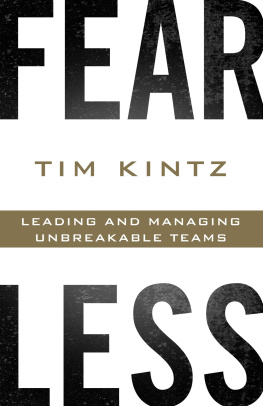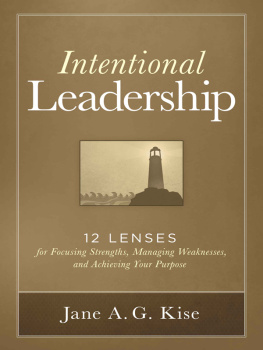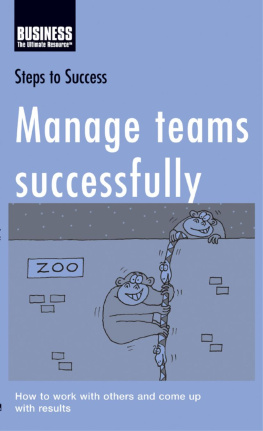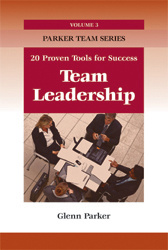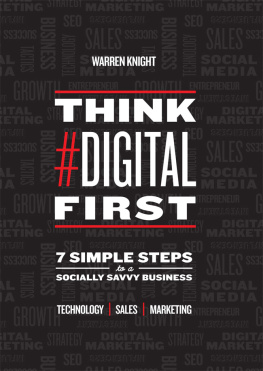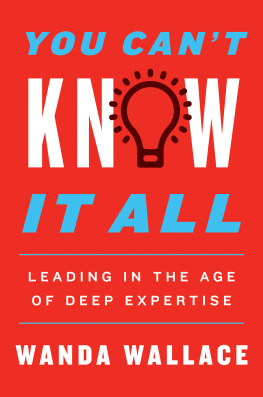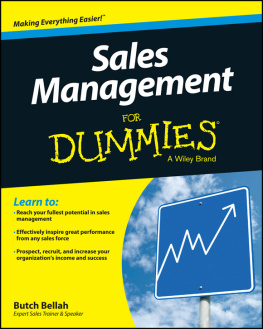All rights reserved.
To all the hardworking, fearless managers who are willing to work through the grind, pay the personal price to create a culture of success, and help their people achieve more than they ever imagined.
To the leaders who sacrificed their time, energy, and often sanity to challenge me to improve and get out of my comfort zone. I wasnt easy to manage and probably gave you gray hair, but the lessons I learned from you are priceless.
To my family, who still loves me even after we were quarantined together. Youre my first and best unbreakable team.
Foreword
My family started selling Fords back in 1911, long before car dealerships came to exist. My great - grandfather had a hardware store, and Model Ts were the newest gadget folks could try to sell. In 1935, my grandfather and his brother started our Ford dealership, and now, four generations since our start, I came home to embrace the family legacy.
That was over twenty years ago, and I had so much to learn, from how to sell cars to how to lead the day - to - day business. I consumed every bit of training I could get my hands onincluding Tim Kintzs sessions for sales. Tim didnt just teach us the ropeshe showed us our potential. And as a young leader, that was exactly the message I needed to hear.
Too many times, the people who can show us what is possible dont show us how to get there, and the people who can teach practical steps dont help us see our potential. Tim is the rare leader who can do both. The greatest gift he gave my company and still gives people to this day is to show us what is possible and then teach us how to make it happen.
Showing and developing a teams potential is part of what it means to lead.
In addition, everyone who has responsibility over a group of people has a fundamental decision to make: will you use your people as a tool for the company, or will the company be a tool for your people?
Some companies choose the former. Their people are no more valuable than any screwdriver or hammer on the shelf. When something like that breaks, you throw it away and replace itand when youre frustrated with your people, you throw them out too. But the best leaders know better. They understand that people are how we grow, and when we develop individuals, the whole company benefits.
And after twenty - plus years, I can promise you this: if you believe your team members are just tools to manage, youre going to be seriously disappointed.
Managers like to believe they can lay down a set of hands - off steps for their teams to follow, and then theyre surprised when nothing goes as planned. Some tell me, I didnt get anything done today but put out fires and deal with people. What they misunderstand is people should not be an interruption to your day. They should be the reason for your day. The second they become an intrusion, youre no longer a leader. Youre a manager.
Leaders fully understand and embrace their role as a coach, as a teacher, and as a mentor responsible for helping their team thrive, starting with each and every individual.
And yes, this is all true for the car business, even if you cant imagine it yet.
Our industry is often seen as purely transactional. Month to month. Feast or famine. You never know what youre going to get or where youre going to be. We tend to let that volatility force us into managingfocusing on the details and the bottom line instead of the people who help create it. Honestly, we use it as an excuse.
The difficult nature of the car business should actually turn us into better, more involved leaders.
Why? Because difficult times are best managed by strong, supported, unbreakable teams. Our job is to get them there.
One of my top salespeople said this: Sewell will accept you just the way you are, but they love you too much to let you stay that way.
Tim Kintz gave us that gift years ago, and hes still doing it today in training and now in this book. Hell work with anyone from where they arebut he cares too much about you to let you stay that way. That means hes going to push you a little bit further than you want to go. Hes going to ask things of you that youre not ready to implement. But he does it because he wants to see you growand after decades of teaching, training, and leading, he knows just how to make that happen.
Before you turn another page, leave all of your judgments and preconceived notions here at the door. For the next few hours, remember what it means to be a student. Let Tims well - worn wisdom show you whats possible when you become a better leader, and then teach you how to make that happen.
Its been more than a hundred years since my grandfather first put a Model T on display, and I hope to one day see my kids take over stewardship of the organization. If they choose to do so, I want to equip them to lead rather than manage, learn rather than judge, and care more about their people than they do the bottom line.
Fearless is an excellent place to begin.
Collin Sewell
Proprietor, Sewell Ford
Preface
My first book was published a year almost to the day before this books release. Frictionless: Closing and Negotiating with Purpose represented training material Ive developed and used for over a decade, specifically focusing on the skills that would help salespeople survive an increasingly digital age. Weeks later, the entire country shut down as part of the COVID -19 pandemic response, sending a shockwave through our industry and driving us all online more than ever.
For years, Ive warned that our industry was on the brink of extinction if we didnt evolve. Over the course of 2020, that shift suddenly became a reality thats impossible to ignore. People who never wanted to touch technology have been forced onto Zoom calls. Stores have been forced to face the state of their websites, then figure out how to deal with online leads more efficiently.
There was no way to predict what happened in 2020. A national emergency of this scale wasnt on anyones radar. Its never been clearer: managers and salespeople need to be ready for anything. Unfortunately, too often our managers are the least trained people in the store. The pandemic forced managers in our industry to face every level of operations from a whole new perspective, and the gaps in our skills, teams, and resources have become painfully clear.
As in Frictionless , Ive taught the material in this book for years. Over and over again, Ive watched managers realize they didnt know what they didnt know. Surviving isnt enough anymore. If we want to stay ahead of competition, keep growing in the middle of a crisis, and keep good people on board through it all, we have to change the way we manage. Its time to become the Fearless leader most of us were never taught to be.
Introduction
In the 1980s, a manager and a coach led a premiere college baseball program in Arizona. They both knew the game. They both loved the game. And they approached the game completely differently.
The manager was old - school , to say the least. He was strict and inflexible, great at pointing out what players did wrong and terrible at telling them what they did right. The coach, meanwhile, was more progressive. Some would call him a players coach. He knew how to motivate, how to inspire, and what players needed to thrive.
When a new kid came through on a recruiting trip, the coach wouldnt just sell him on the baseball program. He would spend most of his time talking to the parents, listening to them and what they cared about, and answering their questions. Sure, he would sell the family on why the player should choose his program, but he wanted to learn about the kid more than he wanted to convince them to join.

